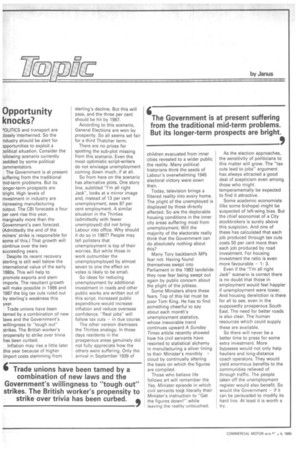Opportunity knocks?
Page 36

If you've noticed an error in this article please click here to report it so we can fix it.
OLITICS and transport are losely intertwined. So the ndustry should be alert for )pportunities to exploit a )olitical situation. Consider the 'allowing scenario currently leddled by some political ommentators.
The Government is at present suffering from the traditional rnid-term problems. But its longer-term prospects are bright. High levels of Investment in industry are Increasing manufacturing output. The CBI forecasts a four per cent rise this year, marginally more than the Government's own forecast. (Admittedly the end of the miners' strike is responsible for some of this.) That growth will continue over the two succeeding years, Despite its recent recovery sterling is still well below the international value of the early 1980s. This will help to promote exports and stem imports. The resultant growth will make possible in 1986 and 1987 the big tax cuts ruled out by sterling's weakness this year.
Trade unions have been tamed by a combination of new laws and the Government's willingness to "tough out" strikes. The British worker's propensity to strike over trivia has been curbed.
Inflation may rise a little later this year because of higher import costs stemming from sterling's decline. But this will pass, and the three per cent should be hit by 1987.
According to this scenario, General Elections are won by prosperity. So all seems set fair for a third Thatcher term.
There are no prizes for spotting the sub-plot missing from this scenario, Even the most optimistic script-writers do not envisage unemployment coming down much, if at all.
So from here on the scenario has alternative plots. One story line, subtitled "I'm all right Jack", looks at a mirror image and, instead of 13 per cent unemployment, sees 87 per cent employment. A similar situation in the Thirties (admittedly with fewer unemployed) did not bring Labour into office. Why should it do so in 1987? People may tell pollsters that unemployment is top of their worries. But while those in work outnumber the unemploymployed by almost seven to one the effect on votes is likely to be small.
So ideas for reducing unemployment by additional investment in roads and other public works are written out of this script. Increased public expenditure would increase inflation and reduce overseas confidence. "Real jobs" will follow tax cuts — in due course.
The other version dismisses the Thirties analogy. In those days residents in the prosperous areas genuinely did not fully appreciate how the others were suffering. Only the arrival in September 1939 of children evacuated from inner cities revealed to a wider public the reality. Many political historians think the seeds of Labour's overwhelming 1945 electoral victory were sown then.
Today, television brings a filtered reality into every home. The plight of the unemployed is displayed by those directly affected. So are the deplorable housing conditions in the inner city areas suffering most from unemployment. Will the majority of the electorate really think that the Government can do absolutely nothing about this?
Many Tory backbench MPs fear not. Having found themselves swept into Parliament in the 1983 landslide they now fear being swept out again by public concern about the plight of the jobless.
Some Ministers share these fears. Top of this list must be poor Tom King. He has to find something cheerful to say about each month's unemployment statistics, whose inexorable trend continues upward A Sunday Times article recently showed how his civil servants have resorted to statistical alchemy in manufacturing a silver lining to their Minister's monthly cloud by continually altering the basis on which the figures are compiled.
Those who believe life follows art will remember the Yes, Minister episode in which civil servants took literally their Minister's instruction to "Get the figures down!" while leaving the reality untouched. As the election approaches, the sensitivity of politicians to this matter will grow. The "tax cuts lead to jobs" argument has always attracted a good deal of scepticism even among those who might temperamentally be expected to find it attractive.
Some academic economists (like some bishops) might be suspected of left-wing bias. But the chief economist of a City stockbrokers is surely above this suspicion. And one of these has calculated that each job produced through tax cuts costs 50 per cent more than each job produced by road investment. For housing investment the ratio is even more favourable — 1: 3.
Even if the "I'm all right Jack" scenario is correct there is no doubt that those in employment would feel happier if unemployment were lower. And housing dereliction is there for all to see, even in the supposedly prosperous South East. The need for better roads is also clear. The human resources which could supply these are available.
So there will never be a better time to press for some extra investment. More bypasses would not only help hauliers and long-distance coach operators. They would yield enormous benefits to the communities relieved of through traffic. The people taken off the unemployment register would also benefit. So would the Government — if it can be persuaded to modify its hard line. At least it is worth a try.




































































































